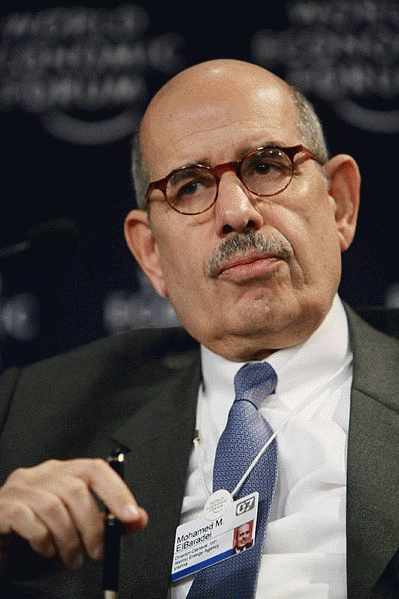Source: IPS

Former IAEA Director General Mohamed ElBaradei referred to a series of documents provided by Israel in his 2012 memoirs.
(Image by Credit: WEF/cc by 2.0) Details DMCA
The Barack Obama administration has demanded that Iran resolve "past and present concerns" about the "possible military dimensions" of its nuclear program as a condition for signing a comprehensive nuclear agreement with Tehran.
But the record of negotiations between Iran and the IAEA shows Tehran has been ready for the past two years to provide detailed responses to all the charges of an Iranian nuclear weapons work, and that the problem has been the refusal of the IAEA to share with Iran the documentary evidence on which those allegations have been based. Administration officials have suggested that Iran must satisfy the International Atomic Energy Agency (IAEA) regarding the allegations in the agency's report that it has had a covert nuclear weapons program in the past.
The real obstacle to providing those documents, however, has long been a U.S. policy of refusing to share the documents on the assumption that Iran must confess to having had a weaponization program.
The head of Iran's Atomic Energy Organization, Ali Akbar Salehi, declared Feb. 12, "The authenticity of each allegation should be proven first, then the person who submitted it to the agency should give us the genuine document. When we are assured of the authenticity, then we can talk to the agency."
Neither the IAEA nor the Obama administration has responded publicly to Salehi's statement. In response to a query from IPS, the spokesperson for the National Security Council, Bernadette Meehan, said the NSC officials would have no comment on the Iranian demand for access to the documents.
The spokesperson for IAEA Director Yukiya Amano did not answer a request from IPS Thursday for the agency's comment.
But a draft text of an agreement being negotiated between the IAEA and Iran dated Feb. 20, 2012, shows that the only difference between the two sides on resolving issues about allegations of Iranian nuclear weapons work was Iran's demand to have the documents on which the allegations are based.
The draft text, which was later published on the website of the Arms Control Association, reflects Iran's deletions and additions to the original IAEA proposal. It calls for Iran to provide a "conclusive technical assessment" of a set of six "topics," which included 12 distinct charges in the report in a particular order that the IAEA desired.
Iran and the IAEA agreed that Iran would provide a "conclusive technical assessment" on a list of 10 issues in a particular order. The only topics that Iran proposed to delete from the list were "management structure" and "Procurement activities," which did not involve charges of specifically nuclear weapons work.
The two sides had agreed in the draft that the IAEA would provide a "detailed explanation of its concerns." But they had failed to agree on provision of documents to Iran by the IAEA. The IAEA had proposed language that the agency would provide Iran with the relevant documents only "where appropriate." Iran was insisting on deletion of that qualifying phrase from the draft.
The first priority on the list of topics to which both sides had agreed in the draft was "Parchin" -- referring to the claim of intelligence from an unnamed state that Iran had installed a large cylinder at the Parchin military reservation.
A November 2011 IAEA report suggested the cylinder was intended for testing nuclear weapons designs and had been built with the assistance of a "foreign expert." Iran also agreed to respond in detail on the issue of the "foreign expert," who has been identified as Vyacheslav Danilenko, a Ukrainian specialist on nanodiamonds.
The evidence associated with that claim and others published in the 2011 report shows that they were based on intelligence reports and documents given to the IAEA by Israel in 2008-09. Former IAEA Director General Mohamed ElBaradei referred to a series of documents provided by Israel in his 2012 memoirs.
Iran also agreed to respond in detail to allegations that Iran had sought to integrate a nuclear weapon into the reentry vehicle of the Shahab-3 missile, and that it had developed high explosives as a "detonator" for a nuclear weapon.
Both alleged activities had been depicted or described in documents reported in the U.S. news media in 2005-06 as having come from a covert Iranian nuclear weapons program.
Those documents, about whose authenticity ElBaradei and other senior IAEA officials have publicly expressed serious doubts, have now been revealed as having been given to Western intelligence by an anti-regime Iranian terrorist organization.
(Note: You can view every article as one long page if you sign up as an Advocate Member, or higher).





